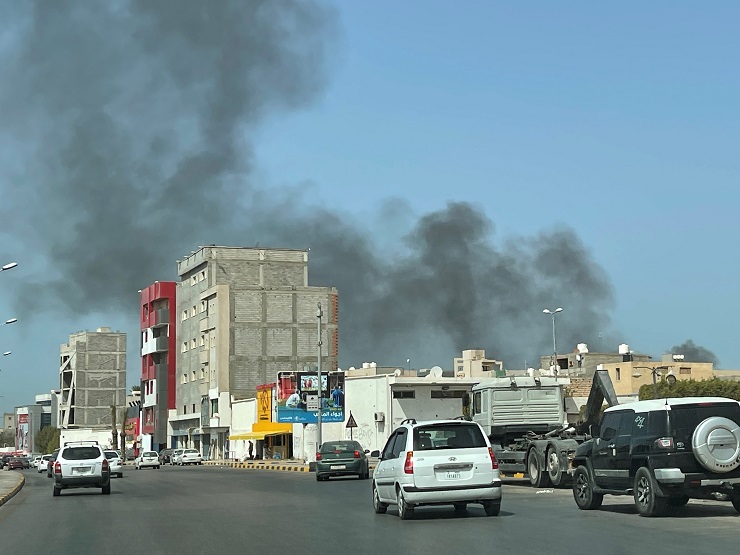Ever since Libyan Jamahiriya leader Muammar Gaddafi was overthrown and sneakily assassinated by European and American champions of “democracy” in 2011, the country has been mired in unimaginable chaos through the fault of the West. Ten years after externally inspired demonstrations and protests, the oil-rich country has been gripped with political instability, violence, economic chaos, and, since last year, an explosion of the COVID-19 epidemic.
On September 21, the Parliament of the eastern part of Libya passed a vote of no confidence in the Government of National Unity formed earlier this year. The interim body, set up to replace two rival administrations that have long fought each other, should lead the country to national elections scheduled for December 24. So, on the one hand, Libya appears to be moving towards peace and stability. Still, on the other, it risks sliding back into civil war when violent clashes between rival factions return to the capital Tripoli.
Foreign involvement may be the main reason why Libya has not been able to move forward and establish a unified, stable administration. External actors, by sponsoring their preferred side in the conflict, periodically add fuel to the fire. Dalia Al-Aqidi, Senior Fellow at the Center for Security Policy, Washington, DC, assesses the current situation this way: “In a country like Libya, achieving security and political stability requires unity among various major political players. However, when you have local politicians with foreign agendas and loyalties, it’s hard to rally around one common goal.” Really that says it all.
Many experts rightly believe that Libya has become little more than a playground for competing foreign interests to grab the spoils of war – oil, arms contracts, and strategic influence. “External support from various groups, patrons and clients supported the conflict as well as the war economy of smuggling, corruption, bribery, racketeering, protection, control of critical infrastructures such as airports, seaports and oil terminals,” said Jonathan Weiner, former US special envoy for Libya and current scholar at the Middle East Institute. The only way to replace such a corrupt and fractious system, Wiener believes, is “a single civilian government that divides the spoils in a way that is inclusive and provides something for almost everyone.”
As a result of prolonged political strife and infighting, ordinary Libyans have witnessed a dramatic drop in their living standards and the destruction of critical infrastructure. Earlier this year, the dinar collapsed, and consumer prices instantly skyrocketed. Fuel shortages and power outages have become commonplace. Even clean water is rare in a country that was once one of the richest in Africa and remains the continent’s second-largest oil producer after Nigeria.
“Libya is a damaged society, but not an unhappy one,” said Karim Mezran, director of the North Africa Initiative and resident senior fellow with the Rafik Hariri Center for the Middle East at the Atlantic Council. “The biggest problems are the COVID-19 pandemic and the fact that the country serves as a significant hub for migration of Africans to Southern Europe. Nevertheless, with some stability, Libya is and should be a prosperous country, given the abundance of oil and other natural resources combined with a relatively small population.”
Instead of emerging from the Gaddafi era with greater openness, economic growth, and productive engagement with the international community, Libya is still experiencing lawlessness and institutional collapse, becoming something close to a failed state. “A decade of violence and unrest, a struggling economy, and the COVID-19 pandemic have compounded the challenges facing everyone living in the country,” Tom Garofalo, the International Rescue Committee’s Country Director for Libya, said in his recent statement. Today, an estimated 1.3 million people require humanitarian assistance – a 40% increase from 2020 alone.
Experts agree that Libya lacks true leadership, a strong politician who could unite the people, politicians, and parties and lead them towards being a prosperous country. Weiner said the UN needs to be “much stronger, firmer, tougher, and more stable” to stabilize the country. “There have to be consequences when countries say one thing, such as promising to keep the peace and withdraw their troops but do another, like supporting their clients and keeping their mercenaries and military support,” he said. There is no doubt that significant progress has been made in the past year in resolving the differences in Libya. Nevertheless, many experts on Libya believe that securing the elections is of paramount importance.
The agreement just reached in Geneva by Libyan 5+5 Joint Military Commission on a process for the withdrawal of mercenaries and foreign fighters from the country inspires some optimism. UN Secretary-General Antonio Guterres said the action plan was “a cornerstone in implementing the October 2020 ceasefire agreement,” as he called Libyan and international authorities to act on it. The UN Secretary-General hopes that the deployment of an initial team of United Nations ceasefire monitors will “help set the stage for the successful implementation of the action plan,” said Spokesperson Stéphane Dujarric.
Still, the world hopes that Libya will halt its descent into the abyss of chaos and begin the process of restoration of statehood.
Viktor Mikhin, corresponding member of RANS, exclusively for the online magazine “New Eastern Outlook”.
 RSS Feed
RSS Feed















 October 22nd, 2021
October 22nd, 2021  Awake Goy
Awake Goy 
 Posted in
Posted in  Tags:
Tags: 













